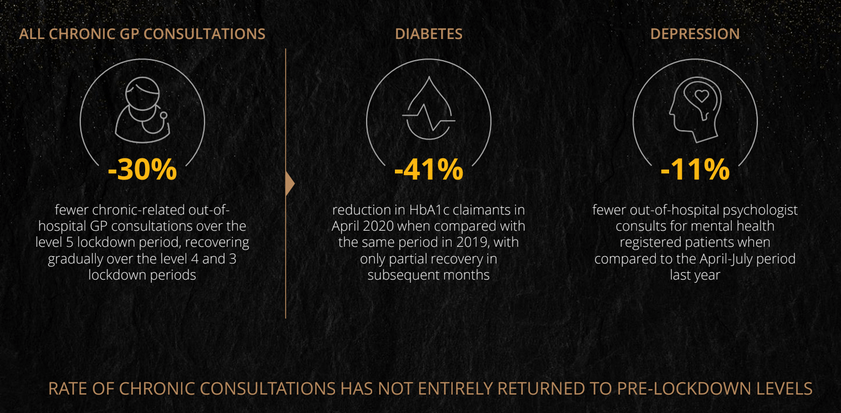Data insights from financial services group Discovery, shows that up to 16,000 South African lives will have been saved from Covid‑19 related deaths by 2021, as a result of efforts to curb the spread of the virus.
However, the country’s largest private medical aid provider, noted that the Covid-19 pandemic has also impacted health-seeking behaviour, with a deterioration in the screening, registration and management of new and existing chronic conditions – most notably breast cancer.
“The Covid-19 pandemic continues to significantly impact our country on multiple levels, not least of which is the toll on human life and health, and the far-reaching consequences of the economic impact,” said chief executive officer of Discovery Health, Dr Ryan Noach.
“However, we are encouraged by research that indicates that, by the end of 2020, up to 16 000 South African lives will have been saved as a result of our country’s early lockdown and related measures instituted to curb the spread of Covid‑19 in our country.
“The data also shows that, as a result of these decisions, we have achieved lower infection fatality rates when compared with other countries globally.”
“These clinical and epidemiological benefits are demonstrable, and the prevention of loss of life in South Africa is an outstanding achievement. However, in the context of this excellent performance, we remain cognisant of the potentially long-lasting economic impact and realities of the lockdown. The primary aim of our national lockdown – to save lives – has been achieved.”
National statistics indicate that, by 9 September, South Africa had experienced in excess of 640,000 infections and 15,000 deaths relating to Covid-19.
“However, global research shows that an extraordinary number of Covid-19 cases remain undiagnosed with an estimated rate of asymptomatic cases varying in the literature from 40% in some studies to up to 75%,” says Dr Noach. “We have looked further into these insights.”
Real infection rate
The South African Medical Research Council (SAMRC) regularly publishes information on deaths in the country and their data shows an inordinate increase in natural deaths (“excess natural deaths” not recorded as linked to Covid-19) over the period of the pandemic, compared to historical data.
Based on SAMRC data, up to 24 August 2020, estimates indicate that the real Covid-19 death rate could be up to 3.1 times higher than that reported, Discovery said.
“Extrapolating from these insights, based on the infection fatality rate at the outset of the epidemic – which has reduced as treatment improved – Discovery Health estimates that approximately 13 million South Africans have been infected. This represents an infection rate of 22%, affecting approximately one quarter of adults in the country,” it said.
These findings are consistent with the initial results of a seroprevalence survey conducted by the Cape Town Metro, indicating that 37% of pregnant women and 42% of people living with HIV had tested positive for Covid-19 antibodies,.
Treating non Covid-19 illness
Discovery pointed to a worrying decline in general health-seeking behaviour.
“A serious, unexpected consequence of the pandemic is a reduction in health-seeking behaviours among high-risk members who perceive seeing their doctor as increasing their risk of exposure to Covid-19,” said head of Discovery Health’s Centre for Clinical Excellence, Dr Noluthando Nematswerani.
Discovery’s data shows that, compared to the same period last year, there has been:
- A 42% decrease in wellness tests and broader screening activities leading to fewer diagnoses of chronic conditions;
- A 44% reduction in breast cancer diagnoses and a 51% reduction in mammograms performed (with advanced cancers far more complex to treat and associated with poorer outcomes);
- A 51% decline in members registering for treatment for depression; and
- Poor management of existing chronic conditions with 30% fewer GP consultations related to chronic care over the level 5 lockdown period.

“We urge all those who require general healthcare to access it through digital services or in-person visits and optimise their outcomes,” said Dr Nematswerani.
“The light at the end of this tunnel is that the Covid-19 pandemic has accelerated the adoption of digital platforms that balance the need for routine healthcare and ensuring patient and provider safety.
“We had made digital healthcare platforms available prior to the pandemic and are encouraged by the rapid increase in the adoption of virtual consultations across specialities that we have seen among our members.”

Read: Adrian Gore on what’s next for Discovery Bank in South Africa


